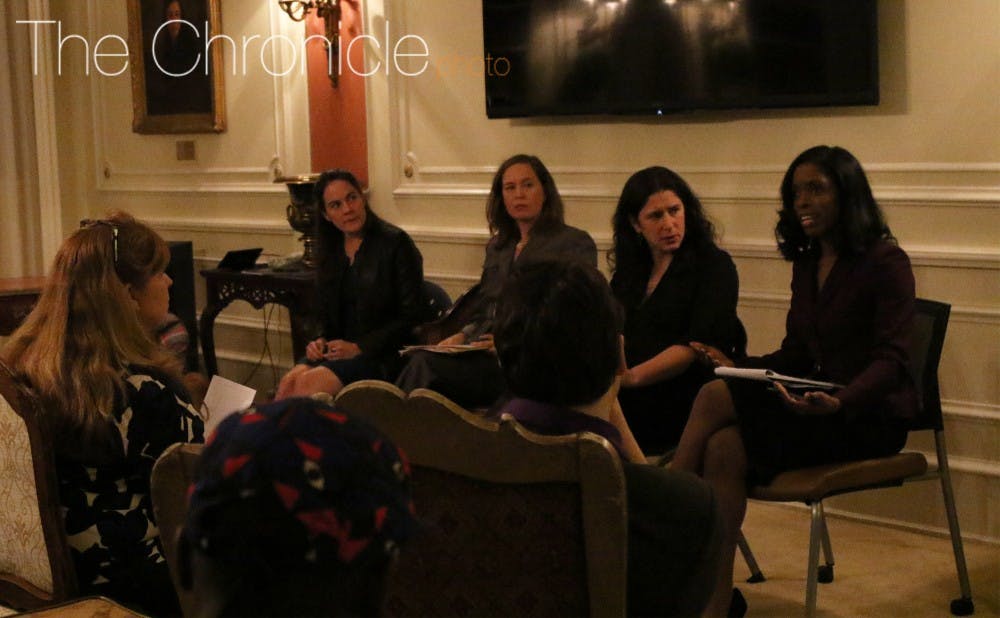The words “motivating," “alarming” and “cathartic” were thrown around the Pink Parlor Room of East Duke Monday as frustrated students, journalists and professors grappled with the results of the 2016 presidential election.
Students in the “Women in the Public Sphere: History, Theory and Practice” course gave a presentation on interviews they conducted with friends and peers after the election in an effort to understand how millennials felt. This was followed by a roundtable discussion with two journalists—Annie Linskey, a reporter for the Boston Globe’s D.C. bureau, and Rebecca Traister, a writer-at-large for New York Magazine—as well as Deondra Rose assistant professor in the Sanford School of Public Policy.
“I took this election as something of a referendum on the American Dream,” Rose said. “So often times we are given this idea that you work hard, play by the rules, become qualified, learn how to do it well and then you will be successful. I think the rules were turned on their head in this case.”
Monday night’s student presentation was the capstone group project for a course taught by Rachel Seidman, visiting assistant professor of gender, sexuality and feminist studies. Students were tasked with interviewing two individuals and presenting their findings to the audience.
Maria Magdalena Berrios, a graduate student in the class, said her interviewees felt that “everything changed after the election," and that they were scared of being interviewed because of the possible conflicts and ramifications. Senior Chaz Hawkins said that he was cooking eggs when his housemate informed him that he was voting for Trump—prompting Hawkins to plate the eggs, go into his room and yell “why?!” through the locked door.
Another member of the class, sophomore Vivian Luo, said talking to people with different political views allowed her to take a step back and listen to the reasoning behind decisions that were different from hers.
“For me, I was interviewing my conservative friend over the phone, so it was easy for me to scream into my pillow while she kept talking,” Luo said.
The panel consisting Rose, Traister, and Linskey primarily discussed why Hillary Clinton lost the election.
“I love that she was counting on a coalition of voters who this country’s power structures were built on top of—of people of color and women,” Traister said. “She was also betting that after electing the first African American president, that we would elect a woman. That was a risky bet, as we now know.”
Traister noted that she has not always been a fan of Hillary, citing her support of John Edwards in the 2008 primary and her early criticism of Clinton’s “centrist” policies.
As for the 2016 election, Traister said that she initially did not want Clinton to run at all—because gender is “always” a factor.
“I didn’t want her to run because I was worried that it would end badly—that she would lose — and that it would be catastrophic,” she said. “The first person, the trailblazer, in any category bears too much symbolic weight, and no one person can bear all that weight.”
Linskey, who followed Clinton for two years as a member of the traveling press pool, was critical of assertions that sexism was the deciding factor in the election.
“Her inability to deal with her flaws was just jaw-dropping for me,” she said.
Linskey, who like Clinton is a graduate of the all-female Wellesley College, said that sexism in politics manifests itself in a different and more internalized way.
She noted that Massachusetts senator Elizabeth Warren looked herself in the mirror in 2014 and decided that Clinton was more qualified to run for the presidency, so decided not to run. Men, she explained, did not do the same—citing Jim Webb and Lincoln Chaffee.
Traister, who sat down with Clinton while working on an article about her, drew a stark contrast between the personality Clinton embodied in their one-on-one conversation and her public persona.
Reacting overall to the election, Rose said that was still trying to process it. Linskey noted that it was Clinton's election to lose.
“She had every single advantage—money, endorsements,” Linksey said. “I just think that the person who lost this race was Hillary Clinton, and seeing so many women hear it breaks my heart. I just hope that you’re not going to take away from this some sort of huge rejection of women, or that people hate women. She did a bad job.”
Get The Chronicle straight to your inbox
Signup for our weekly newsletter. Cancel at any time.
Bre is a senior political science major from South Carolina, and she is the current video editor, special projects editor and recruitment chair for The Chronicle. She is also an associate photography editor and an investigations editor. Previously, she was the editor-in-chief and local and national news department head.
Twitter: @brebradham
Email: breanna.bradham@duke.edu

